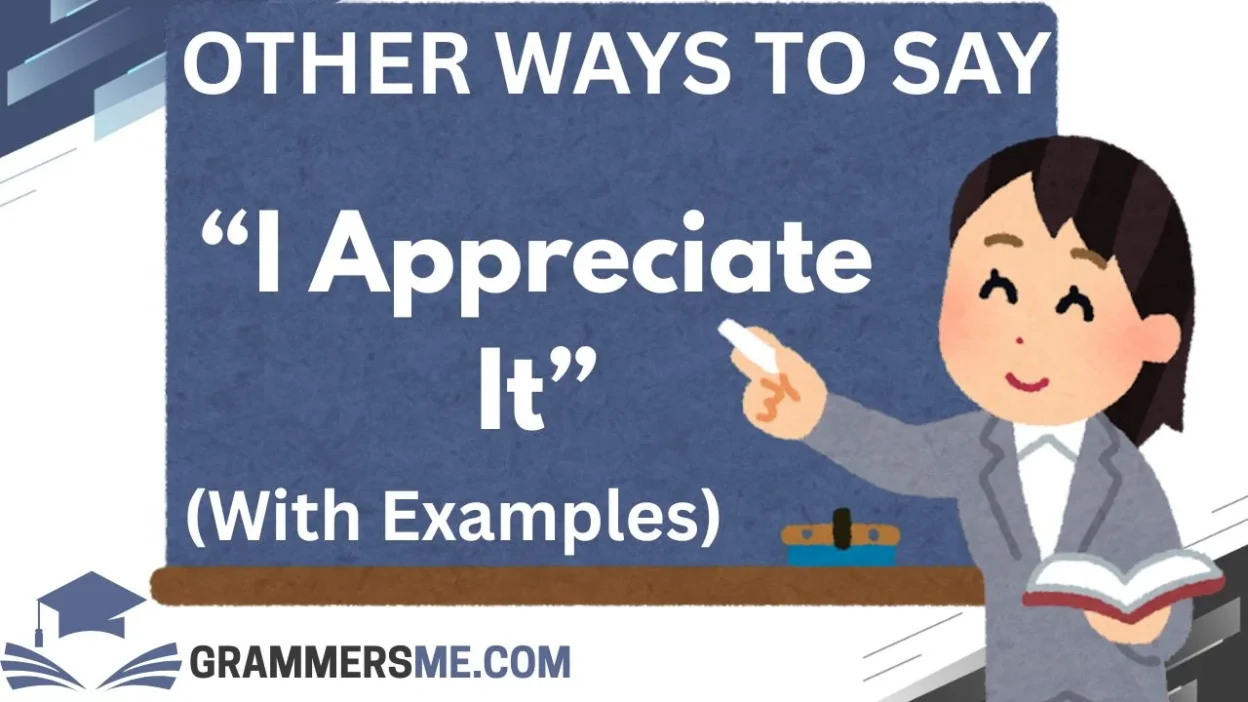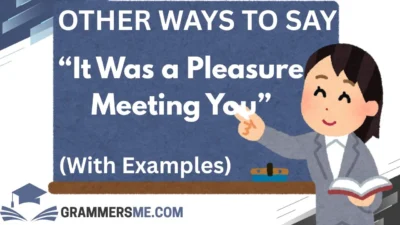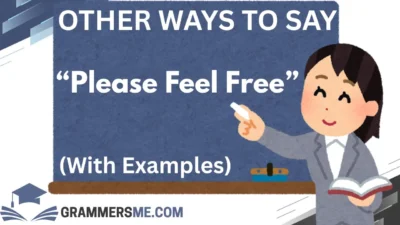Expressing gratitude is one of the simplest yet most powerful ways to strengthen relationships, both personal and professional. However, sometimes the phrase “I appreciate it” can feel a bit overused or lacking in emotion. If you’re looking for fresh, meaningful ways to communicate your appreciation, you’re in the right place!
These alternatives not only convey your gratitude but also add warmth, care, and personality to your words. Whether you want to express your thanks to a friend, colleague, or loved one, these alternatives will help you say it in a way that feels genuine and thoughtful.
What Does “I Appreciate It” Mean?
“I appreciate it” is a way of expressing gratitude or acknowledging someone’s effort or kindness. It’s an easy way to show someone that their actions or gestures have been noticed and valued. However, finding alternative ways to convey appreciation can help make the sentiment feel even more heartfelt and specific to the situation. It’s all about connecting on a deeper level and expressing your feelings in a way that’s authentic.
Is It Professional/Polite to Say “I Appreciate It”?
Yes, “I appreciate it” is both professional and polite, but depending on the context and tone, it can sound formal or somewhat detached. If you’re communicating in a professional setting, it works perfectly, but sometimes adding a little more warmth or specificity can make it even more effective. Using alternative phrases allows you to adapt to the tone of the situation, whether you’re being formal, casual, or informal.
1. Thank You So Much
Meaning: A very common, warm, and direct expression of gratitude.
Explanation: “Thank you so much” carries a deeper, more heartfelt emotion than a simple “thank you.” It’s perfect when someone goes out of their way to help you.
Scenario Example: After a friend takes time out of their day to help you move apartments.
Best Use: When you want to show significant appreciation for someone’s effort.
Not Use: For minor favors or very formal situations.
2. I Can’t Thank You Enough
Meaning: An emphatic way to express that your gratitude goes beyond words.
Explanation: This phrase conveys a sense of deep gratitude, indicating that words alone can’t capture how thankful you are.
Scenario Example: After a mentor provides you with invaluable career advice.
Best Use: When you feel deeply grateful and are trying to express that your appreciation is beyond measure.
Not Use: For situations where a simple “thank you” suffices.
3. I’m Truly Grateful
Meaning: A sincere way to acknowledge someone’s actions.
Explanation: This is a more formal alternative to “I appreciate it.” It communicates genuine, heartfelt gratitude.
Scenario Example: After a colleague helps you meet a tight deadline.
Best Use: When expressing gratitude in a more formal or professional setting.
Not Use: In informal or casual settings where a lighter expression would be better.
4. I’m So Thankful
Meaning: A softer, more emotional way of expressing gratitude.
Explanation: This phrase carries warmth and sincerity, making it ideal when you want to add a personal touch to your thanks.
Scenario Example: When a friend listens to your problems and offers emotional support.
Best Use: In close relationships, where emotional connection is strong.
Not Use: In professional or distant settings where more neutral language is preferred.
5. You’re the Best
Meaning: An informal and enthusiastic expression of gratitude.
Explanation: This phrase is often used to express admiration along with gratitude. It’s casual, yet it shows deep appreciation.
Scenario Example: When a friend buys you coffee after a tough day.
Best Use: In informal situations, especially with friends and family.
Not Use: In formal business settings.
6. I Don’t Know What I’d Do Without You
Meaning: A heartfelt expression of how essential someone’s help or presence has been.
Explanation: This phrase communicates that someone’s support or kindness has been invaluable to you.
Scenario Example: When a close friend or family member supports you through a difficult time.
Best Use: In very close personal relationships.
Not Use: In formal or professional contexts.
7. This Means the World to Me
Meaning: A way of saying that the person’s gesture is extremely meaningful to you.
Explanation: This phrase emphasizes the depth of your gratitude, showing that their actions have had a significant impact on your life.
Scenario Example: When a colleague steps in to help with a difficult project when you’re overwhelmed.
Best Use: For personal situations where the person’s actions really made a difference.
Not Use: In professional or formal business settings.
8. I’m Deeply Thankful
Meaning: A formal way to express sincere gratitude.
Explanation: This phrase carries weight and is often used when you want to show that your appreciation is profound and genuine.
Scenario Example: After someone writes you a heartfelt recommendation letter.
Best Use: In professional or formal settings where a respectful tone is needed.
Not Use: In casual or informal settings.
9. You Have My Gratitude
Meaning: A formal way to express thanks, often used in professional settings.
Explanation: This phrase is slightly more formal and less commonly used but conveys a deep sense of appreciation.
Scenario Example: When a mentor offers their expertise or guidance.
Best Use: In formal settings, especially professional or academic ones.
Not Use: In informal settings.
10. I Truly Appreciate Your Effort
Meaning: An acknowledgment that the person has put significant work or time into helping you.
Explanation: This phrase emphasizes that you recognize and value the effort someone has made on your behalf.
Scenario Example: After a team member works overtime to help with a project.
Best Use: In professional contexts where acknowledging effort is important.
Not Use: In informal situations where simpler expressions would be more fitting.
11. I Can’t Express How Much This Means
Meaning: A way to convey that words are insufficient to describe the level of appreciation you feel.
Explanation: This phrase communicates that your gratitude goes beyond what you can express in a few words.
Scenario Example: When someone surprises you with a thoughtful gesture, like remembering an important date.
Best Use: In situations where the gesture truly stands out and words alone don’t seem enough.
Not Use: For small, everyday favors.
12. You’re a Lifesaver
Meaning: A casual, enthusiastic way to show someone how much their help has made a difference.
Explanation: This phrase emphasizes that someone’s help was not just appreciated but essential.
Scenario Example: When a friend helps you out during a crisis, like picking up your kids when you’re stuck at work.
Best Use: In informal settings, especially when you’re genuinely relieved or grateful for the help.
Not Use: In formal settings where you need a more neutral expression of thanks.
13. I’ll Always Be Grateful
Meaning: A statement that shows lasting appreciation.
Explanation: This phrase emphasizes that you will carry your gratitude with you for a long time, making it ideal for meaningful gestures or ongoing support.
Scenario Example: When someone provides you with long-term help or emotional support during tough times.
Best Use: In close relationships or situations where you want to express long-lasting appreciation.
Not Use: In quick, casual exchanges.
14. I’m Beyond Grateful
Meaning: A phrase that emphasizes how deep your gratitude is.
Explanation: “Beyond grateful” adds an extra layer of intensity, showing that your appreciation goes above and beyond normal thankfulness.
Scenario Example: When a coworker steps in to help you with an important presentation last-minute.
Best Use: In situations where the gratitude feels profound and significant.
Not Use: For small, everyday tasks where a simpler thank you would suffice.
15. That Was Very Kind of You
Meaning: A polite and warm way to acknowledge someone’s generosity or thoughtfulness.
Explanation: This phrase is often used to thank someone for an act of kindness, whether big or small.
Scenario Example: When a colleague shares helpful resources or advice.
Best Use: In both personal and professional settings to acknowledge kindness.
Not Use: When you want to express more personal or enthusiastic gratitude.
16. I Can’t Express Enough How Much I Appreciate This
Meaning: A longer, more emphatic way of saying “I appreciate it.
Explanation: This phrase conveys that no words can truly capture how thankful you are, making it great for moments of deep gratitude.
Scenario Example: When someone does something extraordinarily thoughtful for you.
Best Use: When you need to emphasize how truly grateful you feel.
Not Use: For simple, quick acknowledgments where a shorter phrase would be more natural.
Read More: 30 Other Ways to Say “Thank You for Lunch” (With Examples)
17. This Is Exactly What I Needed
Meaning: A way of expressing that the person’s help was exactly what you were looking for.
Explanation: This phrase shows that not only do you appreciate the help, but it was timely and just what you needed.
Scenario Example: When a friend provides you with a resource or solution you’ve been searching for.
Best Use: When the help you received was perfectly suited to your needs.
Not Use: When the help wasn’t as useful or specific.
18. I Owe You One
Meaning: An informal way of expressing thanks, with an acknowledgment that you’ll return the favor.
Explanation: This phrase suggests that you’re not just grateful, but you’re willing to reciprocate.
Scenario Example: When a friend helps you with a task and you want to show your appreciation with an offer to return the favor.
Best Use: In casual settings where you’re comfortable offering future help in return.
Not Use: In formal settings where you might need a more professional phrase of thanks.
19. You Made My Day
Meaning: A cheerful, informal way to show that someone’s kindness has significantly brightened your day.
Explanation: This phrase emphasizes the positive impact someone has had on you, making it a warm and personal way to say thanks.
Scenario Example: When someone surprises you with a small gift or gesture.
Best Use: In informal, light-hearted situations.
Not Use: In formal business or professional contexts.
20. I’m Forever Grateful
Meaning: A deep, enduring way to express gratitude, often used for significant acts of kindness or support.
Explanation: This phrase indicates that your appreciation will last for a long time, sometimes even forever.
Scenario Example: When someone provides unwavering support during a major life event.
Best Use: When expressing lifelong gratitude.
Not Use: For small or fleeting favors.
21. This Is So Thoughtful of You
Meaning: A way to acknowledge not just the action, but the thought behind it.
Explanation: This phrase shows that you recognize and appreciate the effort and consideration someone put into their actions.
Scenario Example: When a friend picks up your favorite snack just because they know you’ve had a tough day.
Best Use: When you want to express gratitude for the thoughtfulness behind a gesture.
Not Use: For actions that feel more like duties than thoughtful gestures.
22. You’ve Gone Above and Beyond
Meaning: A way to acknowledge someone for doing more than what was expected.
Explanation: This phrase is often used when someone has made an exceptional effort to help you or support you.
Scenario Example: When a colleague works overtime to help you with a challenging project.
Best Use: When you want to express deep appreciation for extraordinary efforts.
Not Use: For everyday favors or small gestures.
23. I Feel So Lucky to Have You
Meaning: A personal and heartfelt way to express gratitude, indicating that you feel fortunate for the person’s help or presence.
Explanation: This phrase is about showing that you value the person beyond just their actions—it’s also about their role in your life.
Scenario Example: When a friend offers consistent emotional support through difficult times.
Best Use: In personal relationships where you’re expressing deep emotional gratitude.
Not Use: In professional settings where a more neutral expression of thanks is better.
24. You Really Came Through for Me
Meaning: A casual and appreciative way to acknowledge that someone helped you when you really needed it.
Explanation: This phrase highlights the fact that the person made a positive impact, especially during a tough time.
Scenario Example: When a family member helps you out of a jam, like fixing a broken appliance when you’re in a pinch.
Best Use: In informal settings, especially when you’ve been in a difficult spot.
Not Use: In professional or formal business settings.
25. I’m So Lucky to Have You in My Life
Meaning: A heartfelt way to express gratitude for someone’s ongoing presence and support.
Explanation: This phrase shows a deeper appreciation, acknowledging that the person’s presence in your life is a gift.
Scenario Example: When a close friend or loved one helps you during challenging times.
Best Use: When you want to express gratitude for someone who has been consistently supportive.
Not Use: In business contexts where a more formal thanks is appropriate.
26. That Was Really Generous of You
Meaning: A way to acknowledge someone’s generosity and thoughtfulness.
Explanation: This phrase highlights the selflessness of the person’s action and expresses gratitude for their generosity.
Scenario Example: When someone donates money or resources to a cause you care about.
Best Use: In situations where generosity is at the forefront of the act.
Not Use: For smaller or more routine favors.
27. I’ll Never Forget This
Meaning: A way to convey that the person’s actions have made such an impact that it will stay with you forever.
Explanation: This phrase shows that you value their help so much that it will remain in your memory for a long time.
Scenario Example: When someone goes out of their way to help you during a particularly tough time.
Best Use: For significant gestures or acts of kindness.
Not Use: For minor or everyday acts.
28. You Made It Happen
Meaning: A way to express thanks when someone helps you achieve a goal or makes something come to fruition.
Explanation: This phrase conveys that the person played an integral role in your success.
Scenario Example: When a colleague assists you in completing an important project.
Best Use: When you want to thank someone for helping you reach a milestone or achieve something significant.
Not Use: For small, unrelated actions.
29. I Can’t Imagine How Much This Took
Meaning: A way of acknowledging the effort, time, or sacrifice someone made to help you.
Explanation: This phrase shows empathy and recognizes the difficulty of the task the person completed.
Scenario Example: When someone helps you move, and you recognize the hard work involved.
Best Use: When you want to acknowledge the difficulty or effort behind someone’s actions.
Not Use: In situations where the person’s effort was minimal.
30. I Appreciate You
Meaning: A straightforward yet deep way to express gratitude for someone as a person.
Explanation: This phrase goes beyond just appreciating someone’s actions; it acknowledges who they are and how much you value them.
Scenario Example: When a friend supports you unconditionally through tough times.
Best Use: In close relationships where the person has had a significant emotional impact.
Not Use: In professional contexts where a more formal thank you is more fitting.
Conclusion
Finding the right way to express gratitude can make your message feel more personal and meaningful. Whether you use one of these 30 alternatives or create your own, the key is to match your expression of thanks to the situation and the relationship. Remember, a heartfelt thank you, regardless of the phrasing, has the power to strengthen bonds and make others feel valued.
Frequently Asked Questions
- What’s the most common way to say “I appreciate it”?
- “Thank you” is the most common way, but adding words like “so much” or “I can’t thank you enough” can make it more meaningful.
- “Thank you” is the most common way, but adding words like “so much” or “I can’t thank you enough” can make it more meaningful.
- Can I use these alternatives in a professional setting?
- Absolutely! Many of these alternatives work well in professional environments. Just make sure to pick one that fits the level of formality.
- Absolutely! Many of these alternatives work well in professional environments. Just make sure to pick one that fits the level of formality.
- Is it okay to say “I appreciate you” instead of “I appreciate it”?
- Yes! “I appreciate you” is a great way to show appreciation for the person, not just the action.
- Yes! “I appreciate you” is a great way to show appreciation for the person, not just the action.
- How do I know which phrase to use?
- Consider the context and your relationship with the person. For informal, close relationships, you can use phrases like “You’re the best.” In more formal settings, try something like “I’m truly grateful.”
- Consider the context and your relationship with the person. For informal, close relationships, you can use phrases like “You’re the best.” In more formal settings, try something like “I’m truly grateful.”
- Can I get creative with expressing thanks?
- Absolutely! Personalizing your appreciation makes it feel more sincere. Feel free to adapt these phrases or create your own to match your personality and the situation!




